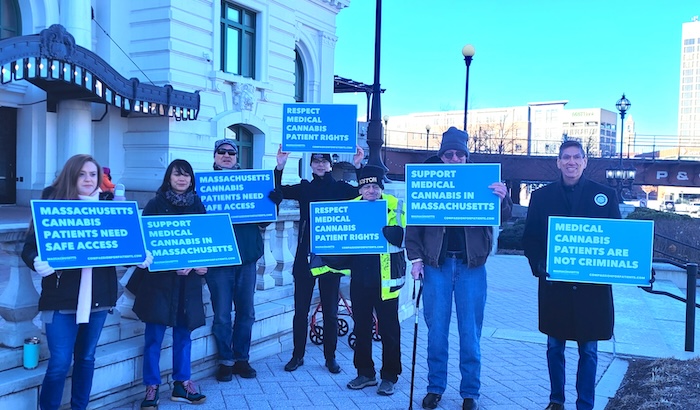
Access to medical marijuana in Massachusetts is unreasonably limited, but there’s an easy fix
Imagine having to travel over 50 miles for medical cannabis, or paying taxes at a recreational dispensary, despite having a medical card—because it’s the only option around. For patients in Massachusetts, this is not a hypothetical but a harsh reality. Access to medical cannabis is being limited artificially while the recreational cannabis industry is allowed to operate without the same restrictions.
As the Drug Enforcement Administration reportedly moves forward with recognizing marijuana’s medical benefits by placing it in Schedule III, the barriers that restrict patient access under state law must be corrected now.
Unlike recreational cannabis businesses, medical marijuana operators in Mass are burdened with a requirement to be vertically integrated, meaning that their business must control every step of the supply chain—from growing plants, manufacturing products, and dispensing items to patients. This has restricted the number of medical cannabis operators, and placed a greater burden on patients seeking access to their medicine.
In 2018, years before I was appointed to the Cannabis Advisory Board, the Industry Subcommittee, along with the Market Participation Subcommittee, had already recommended that the Cannabis Control Commission eliminate this vertical integration requirement. It wasn’t until 2021 that the Cannabis Advisory Board was formally asked to study vertical integration. Later that same year, the CCC introduced its Executive and Legislative Outreach Policy. This policy was designed to bridge the gap between legislative expectations and actual outcomes, giving the commission a way to highlight these gaps with lawmakers. Since then, the agency has used this policy to support important initiatives, including the Cannabis Social Equity Trust Fund, updates on social consumption, OUI legislation, revisions to driver education, and improved access for veterans. Yet, the vertical integration issue remains unaddressed.
In 2022, both the Public Health Subcommittee and the Industry Subcommittee voted to end the vertical integration requirement. The recommendation was ultimately adopted by the full Cannabis Advisory Board in September 2023. Despite ongoing advocacy and numerous legislative efforts, no changes have been implemented. Lawmakers have introduced bills aimed at dismantling this outdated mandate since 2019, with H.4409 being the most notable and recent effort.
H.4409 was introduced by the Joint Committee on Cannabis Policy in February 2024. It would eliminate the vertical integration requirement in medical marijuana licensing and establish a 36-month exclusivity period for social equity businesses to operate these new medical marijuana establishment licenses. Currently, there are zero social equity businesses operating in the Massachusetts medical marijuana industry. H.4409 offers a promising path to make the medical marijuana marketplace more inclusive for diverse entrepreneurs. Additionally, if progress is made towards increasing equitable participation, the commission can consider extending this period and include women-owned, minority-owned, and veteran-owned businesses, as well as craft cooperatives.
Now under review by the House Ways & Means Committee, H.4409 has significant momentum and does not require additional state funding, as it falls within the CCC’s existing budget. This legislation’s fiscal implications are negligible, something that should help it pass. If the CCC uses its Legislative Outreach Strategy to support the elimination of vertical integration and promote equitable practices within our medical cannabis industry, it would go a long way, and demonstrate their commitment to equitable policies that help patients.
Imagine the impact that lifting these restrictions could have on the lives of patients across Massachusetts. This legislative momentum, along with vocal advocacy, offers a real chance to finally unlock the medical marijuana program’s full potential. By removing these outdated barriers, we can transform lives and ensure that medical cannabis is equitable and accessible to those who need it, no matter where they live.
Learn more about this and other issues facing medical cannabis patients via the Massachusetts Patient Advocacy Alliance.

























